December 21, 2024 | 23:47 GMT +7
December 21, 2024 | 23:47 GMT +7
Hotline: 0913.378.918
December 21, 2024 | 23:47 GMT +7
Hotline: 0913.378.918
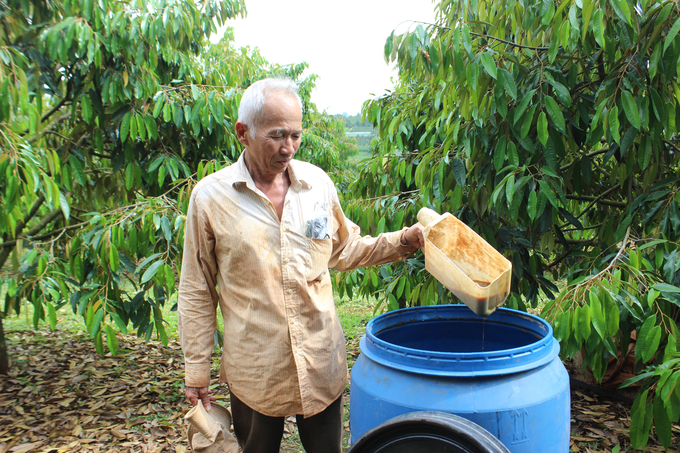
Phan Van Vinh utilizes only biological products for pest control on his durian trees. Photo: Tuan Anh.
The use of biological pesticides is becoming increasingly common among residents in Ia Grai District, Gia Lai Province.
According to the Department of Agriculture and Rural Development of Ia Grai District, the district currently lacks a survey to evaluate the market share of biological pesticides compared to chemical pesticides. However, local agricultural production monitoring reveals that the market share of biological pesticides has been trending upward in recent years. Additionally, local residents are focusing on using biological pesticides, herbal preparations, and microbial products for pest control due to their high safety, absence of pesticide residues in agricultural products, and compliance with export quality standards.
Phan Van Vinh, a farmer from Group 6 in Ia Kha Town, Ia Grai District, is a prime example of effective biological product usage with his family's durian farm.
Phan Van Vinh stated that his family's farm of 350 durian trees has relied solely on biological products created through self-composting with microbial preparations for the past year. His family combines molasses with EM (effective microorganisms) and available materials to produce effective biological products for crop cultivation.
“Biological products help protect the durian trees from fungal and bacterial diseases. This product can be applied as much as needed without harming the surrounding environment,” Phan Van Vinh shared.
Phan Van Vinh reported that his 350 durian trees yielded more than 24 tons of fruit during the last crop, generating a revenue of over 1.5 billion VND.
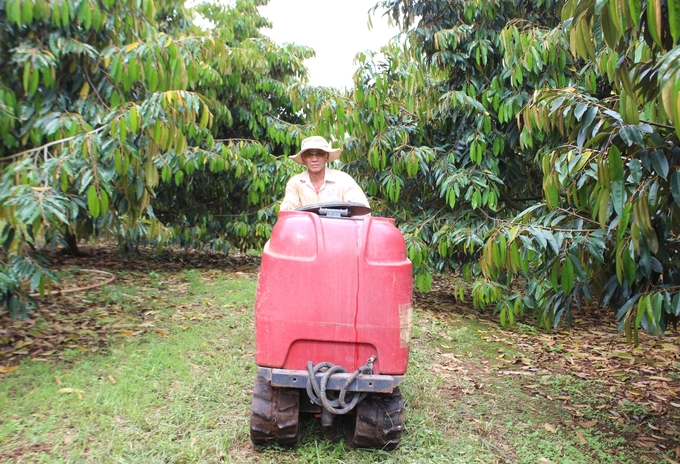
Phan Van Vinh using a sprayer for biological products in his farm. Photo: Tuan Anh.
Phan Van Vinh also noted that unpredictable weather conditions during the recent harvest resulted in significant losses for durian farmers in the area. Moreover, durian trees were damaged by pests and diseases, causing most fruits to become fibrous and unsuitable for sale.
However, due to the long-term use of biological products, Vinh's durian farm exhibits remarkable resilience and vitality, with the ability to withstand pests and diseases. To illustrate his point, Vinh showed us the barrels containing the self-composted biological products. He explained that after the durian harvest, his family utilizes solely organic fertilizers and biological products to nourish the farm. He emphasized that the use of chemical pesticides at this stage of the durian's growth cycle can cause sap to ooze from the trees.
“The use of biological products promotes sustainable growth for the durian trees. However, it requires continuous application to achieve effectiveness, which not all farmers are willing to commit to,” Phan Van Vinh stated.
With the aim of promoting sustainable agriculture, farmers in Ia Ba Commune, Ia Grai District, have gradually eliminated the use of chemical products in favor of biological pesticides.
With a durian farm spanning over 2 hectares, Nguyen Viet Khang, a resident of Chu Hau 6 Hamlet, Ia Ba Commune, Ia Grai District, shared that his family previously intercropped durian with coffee trees, which produced low yields due to pest problems. Subsequently, his family switched to exclusively growing durians and using organic fertilizers, particularly a mix of cow dung and straw compost.
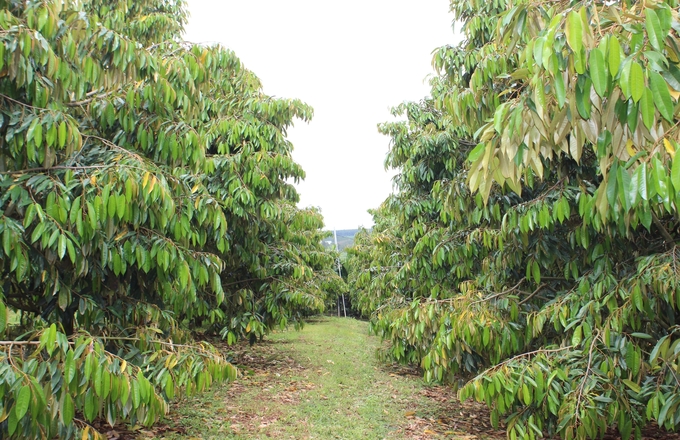
Phan Van Vinh's durian farm maintains a lush and green look with the adoption of organic farming practices and use of biological products. Photo: Tuan Anh.
As part of the organic cultivation process, Nguyen Viet Khang primarily employs biological pesticides to prevent diseases in his family's crops. Drawing from his experience, Khang's family focuses on regularly using biological pesticides during the timeframe from when the durians bloom until the fruits set, to combat sucking pests and common fungal diseases.
“Biological pesticides leave no odor on the durians, making the process more pleasant and safe for the health of farmers. Moreover, farmers can keep the surrounding environment clean, and the quality of the durian fruit is significantly better,” Khang shared.
According to Khang, there is a growing demand for products with a higher level of quality, forcing farmers to adapt and meet these requirements.
Regarding the role and effectiveness of biological pesticides in agricultural production, Phan Dinh Tham, Head of Agriculture and Rural Development in Ia Grai District, commented that local biological pesticide products typically originate from natural sources or are produced using biotechnology. They help reduce environmental pollution compared to traditional chemical pesticides.
These products pose less harm to non-target organisms, such as wildlife, beneficial insects, and soil microorganisms, thereby protecting agricultural ecosystems, maintaining ecological balance, and promoting sustainable agriculture. This approach reduces dependence on harmful chemicals and minimizes the risk of developing pesticide resistance. More importantly, the use of biological products protects the health of both farmers and consumers.
Phan Dinh Tham also highlighted several limitations of biological pesticides, including stricter storage requirements compared to chemical pesticides, a shortened shelf life, and slower effectiveness than their chemical counterparts.
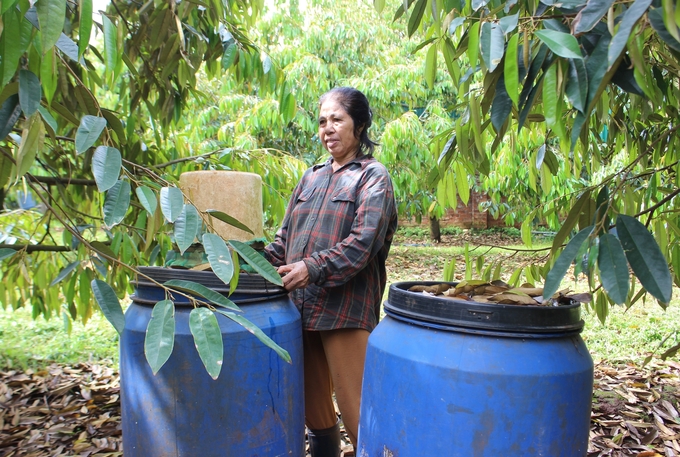
Farmers in Gia Lai Province have grown increasingly aware of the importance of self-produced biological products in fertilization and pest control. Photo: Tuan Anh.
Tran Xuan Khai, General Director of the Gia Lai Province's Sub-Department of Crop Production and Plant Protection, stated that the widespread use of biological pesticides will bolster the development of organic and green agriculture, thereby enhancing product quality and value. Additionally, this initiative contributes to reducing environmental pollution and improving soil health to support sustainable agricultural development.
Tran Xuan Khai further highlighted that Gia Lai Province aims to become a leader in the Central Highlands in terms of the use of biological pesticides by 2025.
“With this mission in mind, the Sub-Department has actively advised farmers to increase the production of organic and biological products in their cultivation practices. We prioritize the use of biological pesticides in production and promote the implementation of Integrated Pest Management (IPM) and Integrated Plant Health Management (IPHM),” General Director Tran Xuan Khai shared.
He emphasized the importance of using only biological products that are registered in the approved list for use in Vietnam, as well as products that contain beneficial microorganisms to control pest organisms on crops.
“The province's agricultural sector will integrate this approach into training sessions to educate cooperatives, cooperative groups, and farmers on the long-term benefits of biological products. Additionally, the district will collaborate with the business community to implement sustainable agricultural projects through the effective use of organic fertilizers and biological pesticides,” stated Phan Dinh Tham.
Translated by Nguyen Hai Long
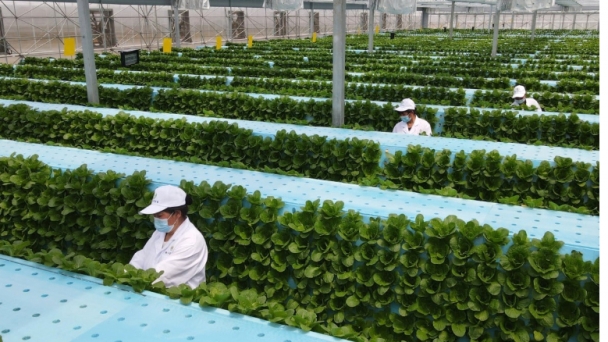
(VAN) China has reduced fertiliser use for eight consecutive years since 2015 and yet the country's agricultural output has steadily increased with 2024 grain production hitting a historic high.

(VAN) Equatic is among a wave of start-ups exploring how the ocean could be harnessed to capture and store carbon. But not everyone is sure it's such a good idea.
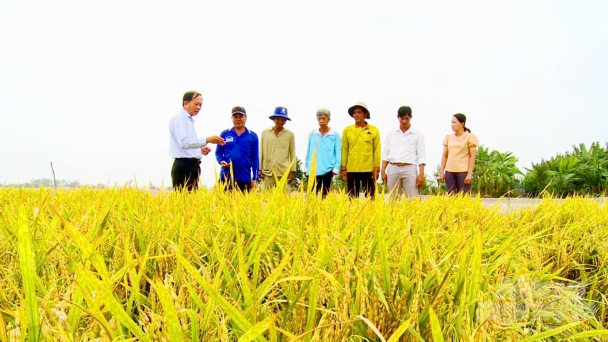
(VAN) An Giang has over 300,000 farmers directly engaged in rice production and 229 cooperatives playing a pivotal role in the implementation of the One Million Hectares of High-Quality Rice Project.
/2024/12/18/1550-3-080744_656.jpg)
(VAN) C.P. Vietnam continues to accompany Dong Thap province to build green embankments to protect land and prevent landslides on river banks in 12 districts and cities.
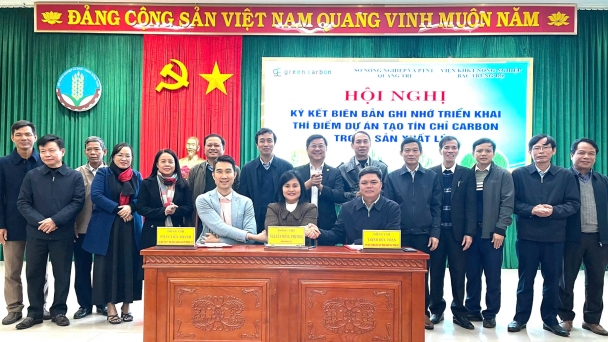
(VAN) The Quang Tri Department of Agriculture and Rural Development collaborates to pilot the Greenhouse Gas Emission Reduction Project in agriculture.
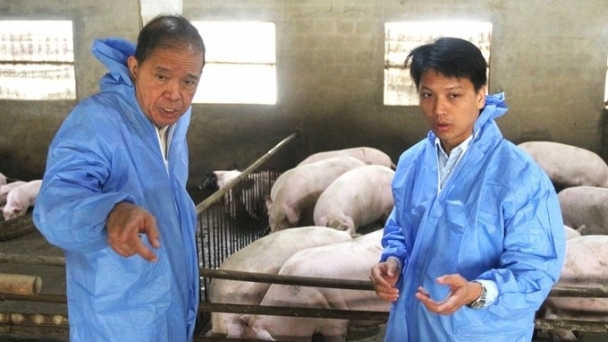
(VAN) Positive results in mass vaccination against African swine fever in Vietnam will become important evaluation bases for other countries.

(VAN) Ha Long Bay's 30-year journey as a recognized world natural heritage site is reflected through the numerous achievements in promoting its heritage's values.